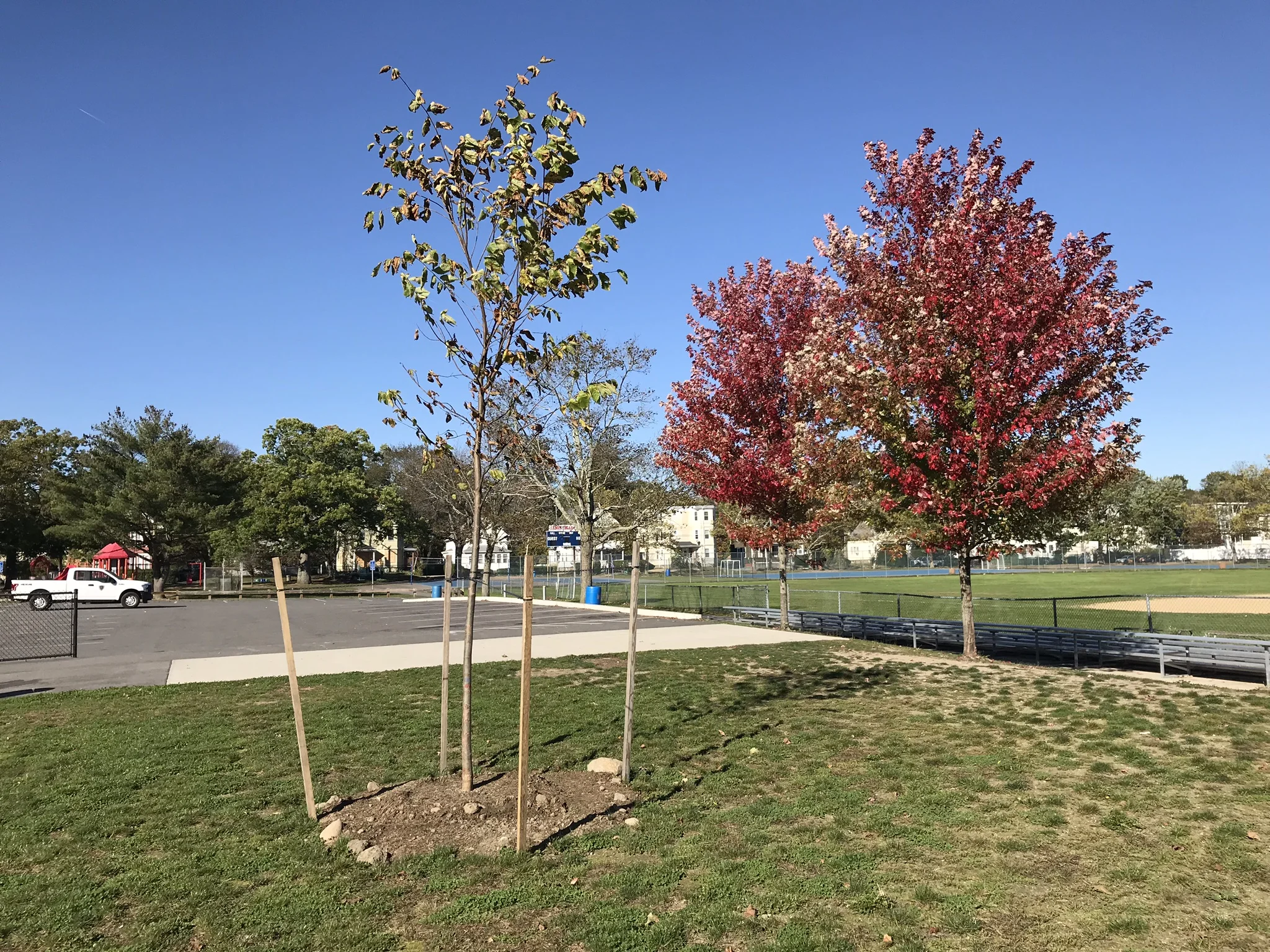Wildlands in an Urban Landscape
By Conor Michaud, Community Stewardship Program Coordinator
A newly planted sapling at a public park in Brockton.
Imagine a typical hot and humid July day in southern Massachusetts, with no breeze and the sun beating down. You decide, enough with the air conditioning, it’s time to breathe some fresh air for a change; so you step outside onto an asphalt driveway and greet the 90-degree day with a smile and a bead of sweat. You decide a good way to beat the heat is by visiting a local conservation area. As you begin your stroll along the woodland loop-trail, enjoying the shade of the trees, you stop at one of the benches on the trail for a short respite; you take in the cool breeze and appreciate the drastic change in temperature from your driveway to where you now sit.
Now, imagine a different scenario: On this same type of day, you stand in your driveway, sweating in the mid-day sun; you can’t believe how hot it is. Looking around, you notice there is no density to the trees along your street, only the occasional 30-foot outlier among the telephone poles, looming over asphalt; there is no nearby pond and no nature preserve within walking distance either. Realistically your only course of action to avoid this heat stress is to return to your home, the air conditioner on full-blast.
Saplings ready to be planted in Brockton.
Urban landscapes offer a multitude of benefits including public transportation, access to a variety of employment, more housing availability, and the innumerable benefits of living alongside other cultures and varying types of people; however, when left unaided, they can also result in dangerous public health conditions and environmental inequality. With minimal tree coverage, these areas become “heat islands”, where the temperature of pavement and roof surfaces can be significantly hotter than the air and, as a result, directly affect the public health and well-being of its residents. “Increased daytime temperatures, reduced nighttime cooling, and higher air pollution levels associated with urban heat islands can affect human health by contributing to general discomfort, respiratory difficulties, heat cramps and exhaustion, non-fatal heat stroke, and heat-related mortality.” [1]
GGC Brockton planting zone (click to enlarge)
In 2012, Wildlands entered into the city of Brockton’s conservation scene through our acquisition of Brockton Audubon Preserve and since then, while we have continued to preserve crucial conservation lands within the city-limits (managing and restoring Stone Farm), we’ve asked ourselves, how could we further our mission in Brockton? How could Wildlands address the ongoing environmental justice issues that affect the residents? One such way, is our work through the Greening the Gateway Cities (GGC) program. In 2017, Wildlands partnered with the Brockton chapter of GGC and, we are proud to report, we’re on track to successfully plant over 2,400 trees by June 2020. Due to its success, for the remainder of the program, we are looking to address a wider range of benefits beyond the economic relief aspects, including the improvement of resident’s quality of life. Our conscious transition to promote the physical and mental health benefits are in an effort to support the concerning public health issues many urban neighborhoods face today.
Wildlands is proud to be a partner in the project and through these collaborative efforts our conservation efforts in Brockton have gained a greater depth, our capacity to address environmental justice issues has been strengthened, and we have become a part of the greater conversation surrounding the future of Massachusetts’s Gateway Cities. While few land trusts have taken on similar environmental justice work, we believe it has been a crucial landmark in our growth as an organization allowing us to not only to tackle these pressing issues but to expand our capacity to protect land in urban areas and bring a voice for environmental conservation, education, and exposure to the commonwealth.
For more information on Greening the Gateway Cities, visit: https://wildlandstrust.org/greening-the-gateway-cities


